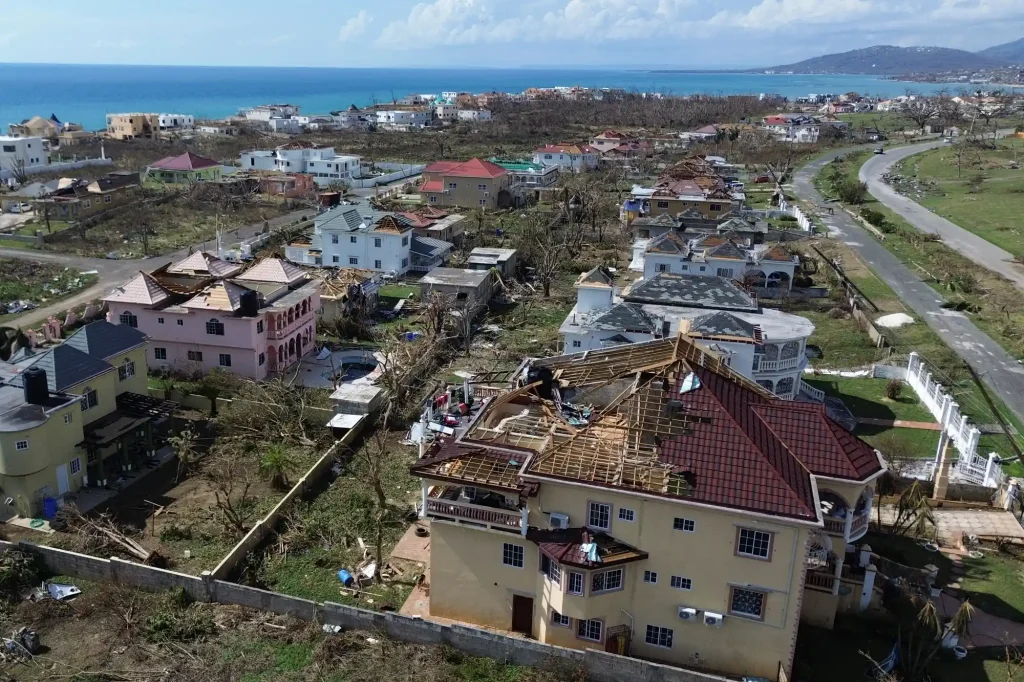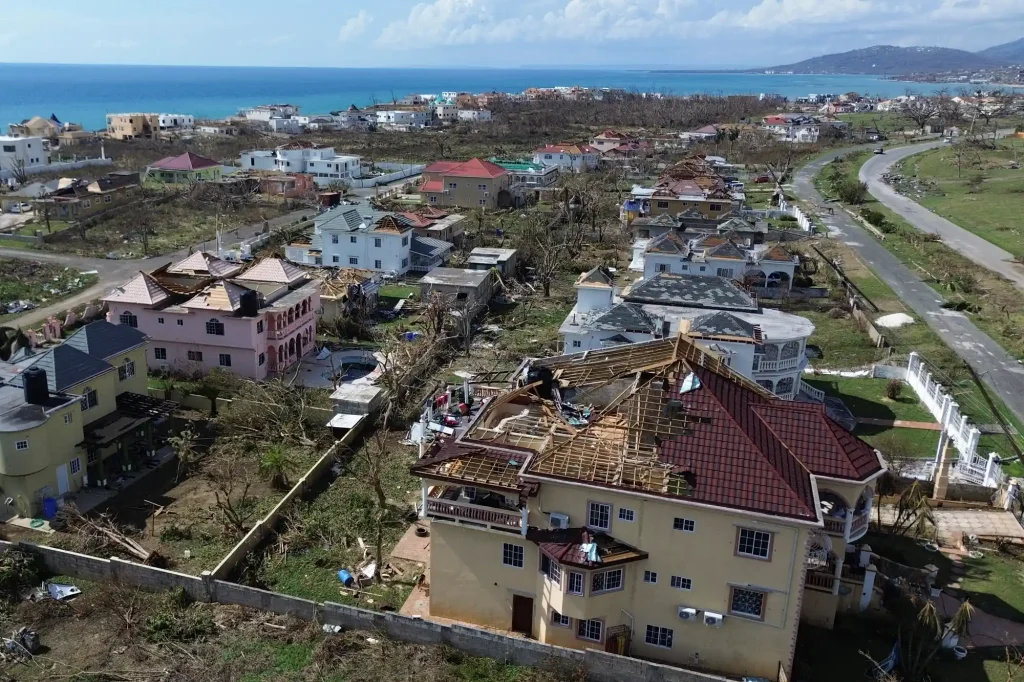She Last Spoke to Her 85-Year-Old Father Before Hurricane Melissa Hit Jamaica — Now a Florida Woman Is Traveling There Herself to Find Him
When Hurricane Melissa slammed into Jamaica with winds topping 150 miles per hour, Kimali Stephen’s life was torn apart by silence. Her 85-year-old father, Albert Stephen, was in Westmoreland, Jamaica, when the powerful Category 5 storm made landfall. Their last conversation — a brief call before the storm knocked out power — is now the only connection she has left. Since then, she’s heard nothing. No call. No message. No sign of life.

“I just feel empty. Hollow. Like just a shell,” Kimali told CBS Miami, her voice trembling as she tried to describe the endless waiting. “Until I can put my eyes on my dad — at least hear his voice.” Her father’s home sat directly in the path of one of the most destructive hurricanes to ever hit Jamaica, and as news of collapsed homes, flooded villages, and blocked roads filled her screen, Kimali made a decision: she would go to Jamaica herself to find him.
Albert Stephen is more than a name on a list of missing persons. He’s a father who raised his daughter with warmth, humor, and a quiet resilience shaped by his decades in the Jamaican military. After retirement, he settled into the calm of Argyle Mountain, a rural part of Westmoreland Parish where the pace of life is slow and the view stretches into the green hills. He loved the quiet mornings and the company of his neighbors. His phone calls with Kimali were frequent — often every other day. But since October 28, 2025, when Hurricane Melissa tore through the island, there’s been only silence.
The storm that changed everything began as a low-pressure system near the Caribbean but quickly gained force as it swept toward Jamaica. Within days, it had strengthened into a Category 5 hurricane, packing winds so violent that entire neighborhoods vanished in minutes. When Melissa made landfall, Jamaica was engulfed in torrential rain, flash floods, and mudslides. For hours, the island’s communication network collapsed, leaving families both at home and abroad desperate for news.
In Miami Gardens, Kimali sat glued to her phone, calling every number she knew. But the lines were dead. The last text she sent to her father never showed as delivered. Then came the gut-wrenching photos and drone footage: mangled rooftops, trees split like matchsticks, cars washed away. One clip showed a section of Argyle Mountain reduced to debris. “I just couldn’t breathe,” she said. “It felt like the world stopped.”
Her father had always been careful during storms. He’d lived through hurricanes before — Gilbert in 1988, Ivan in 2004, Sandy in 2012. “He’s used to it,” she said. “He always prepares. He fills water bottles, boards the windows, and stays calm.” But this time was different. Melissa was stronger than anything in decades, and it struck faster than anyone expected.
As of early November, the Jamaican government confirmed dozens of deaths and more than 300 missing persons across the island, though those numbers may rise. The worst damage was concentrated in the southwestern parishes — Westmoreland, St. Elizabeth, and Manchester — where flash floods destroyed homes and blocked rescue teams from reaching remote communities. Roads collapsed into rivers, and entire villages remained cut off for days.
In that chaos, Kimali’s father vanished. She’s been unable to confirm if his home still stands or if he found shelter elsewhere. Power outages and fuel shortages have crippled communication, making it nearly impossible to reach the area. So Kimali has decided to fly to Jamaica herself, carrying supplies and hope. “I can’t just sit here,” she said. “If my dad’s alive, he’s waiting for me. And if he’s not — I need to know.”
Her decision has drawn attention and support from the Jamaican-American community in South Florida. Friends, church members, and neighbors have begun gathering donations: bottled water, canned food, medical kits, flashlights. Kimali plans to bring what she can to distribute along the way, even as she searches for her father. “There are so many people hurting,” she said. “If I can help someone else while I look for him, I will.”
Hurricane Melissa has been described as one of the most devastating storms in Jamaica’s modern history. With sustained winds near 160 mph and storm surges over 10 feet high, it obliterated homes, uprooted trees, and left thousands displaced. Aid agencies estimate that at least 80% of Westmoreland’s infrastructure suffered damage. Schools, churches, and clinics are now shelters. Many residents are still missing. For those abroad, like Kimali, the waiting has become its own kind of storm.
“Every time I refresh my phone, I pray I’ll see his name pop up,” she said. “Even just one text — anything.” The uncertainty has taken a toll on her health. She says she hasn’t slept properly in a week. “You keep hoping he’ll call. And when the phone stays quiet, your mind goes to the darkest places.”
Still, she refuses to give up. As rescue teams clear debris and international aid arrives, she has been in touch with Jamaican authorities and local volunteers who have promised to help once she lands. She’s also been speaking to media outlets to spread awareness, hoping that someone who’s seen her father might come forward. She describes him as “sharp, gentle, and full of life,” a man who never let his age slow him down. “He walks every day. He jokes with everyone. He’s loved in his community. I just can’t believe he’s gone.”
Her journey will be difficult. With damaged airports, limited fuel, and unsafe road conditions, traveling deep into Jamaica’s interior will take planning and courage. But Kimali says fear is the last thing on her mind. “I’d walk through mud or climb over debris if it meant finding him,” she said. “That’s my father.”
The broader impact of Hurricane Melissa continues to unfold. Relief organizations including the Red Cross, Food for the Poor, and World Central Kitchen are distributing food and water. The Jamaican government has declared a national disaster, with rescue teams working around the clock to reach stranded residents. Yet, for every name added to the list of those found safe, others remain unaccounted for.
Kimali’s story is one of many — but it resonates because it puts a human face on the aftermath of disaster. It’s the face of a daughter who refuses to let uncertainty turn into loss. “I know he’s out there,” she said, her voice firm. “I just have to find him.”
As she prepares to board her flight, Kimali keeps replaying their last phone call. She remembers his calm tone, how he told her not to worry, how he said he loved her before hanging up to secure his windows. “I never imagined that might be the last time I’d hear his voice,” she said. That thought fuels her determination. She’s not just going to search. She’s going to bring him home.
Her friends have created a small GoFundMe to help cover travel and recovery costs. The response has been overwhelming. “People I don’t even know are praying for my dad,” she said. “It gives me strength.” Local churches in Miami have held vigils, lighting candles for missing families across Jamaica. The Jamaican Consulate has also pledged to assist U.S. relatives trying to locate loved ones.
Every natural disaster leaves behind numbers — death tolls, property losses, damage estimates. But behind each number is a story like Kimali’s. A name. A family. A promise made across a phone line before the wind drowned out the world. In those moments, data becomes deeply human.
Even as she packs her bags, Kimali admits she’s terrified. But hope, she says, is stronger than fear. “My dad taught me that. He always said, ‘If you love someone, you fight for them.’ That’s what I’m doing.”
And so, she’s heading into the wreckage left by Hurricane Melissa, driven by love and determination — the kind that defies storms, distance, and despair. In the coming days, she hopes to reach Argyle Mountain, where her father’s small home once stood. Whether she finds him alive or not, she says she’ll bring him peace.
For now, her story stands as a testament to what it means to love across distance and uncertainty — to fight for family even when the world has gone silent. In a time defined by destruction, her hope is its own kind of light. “He’s my dad,” she said softly. “I’ll find him.”


